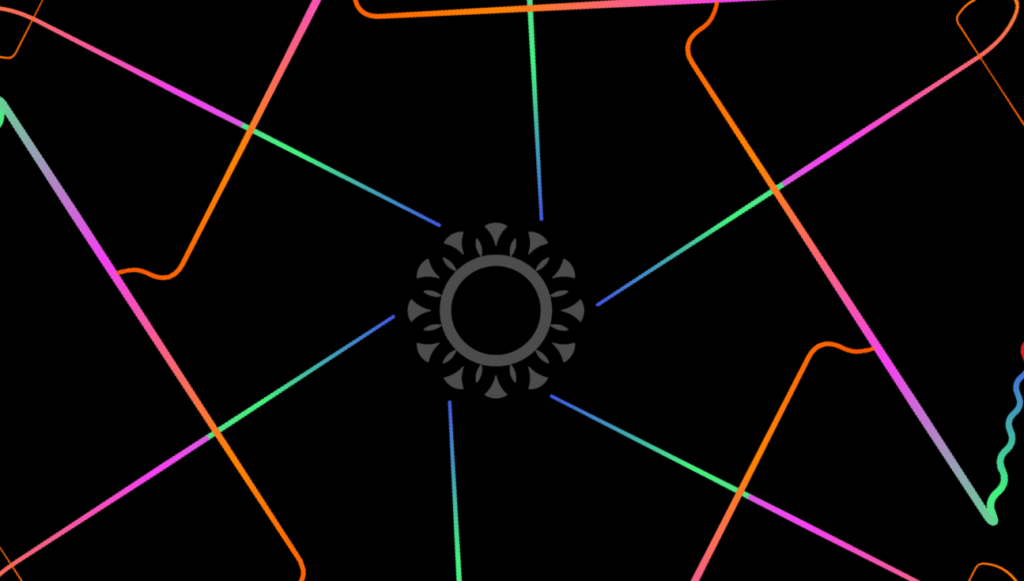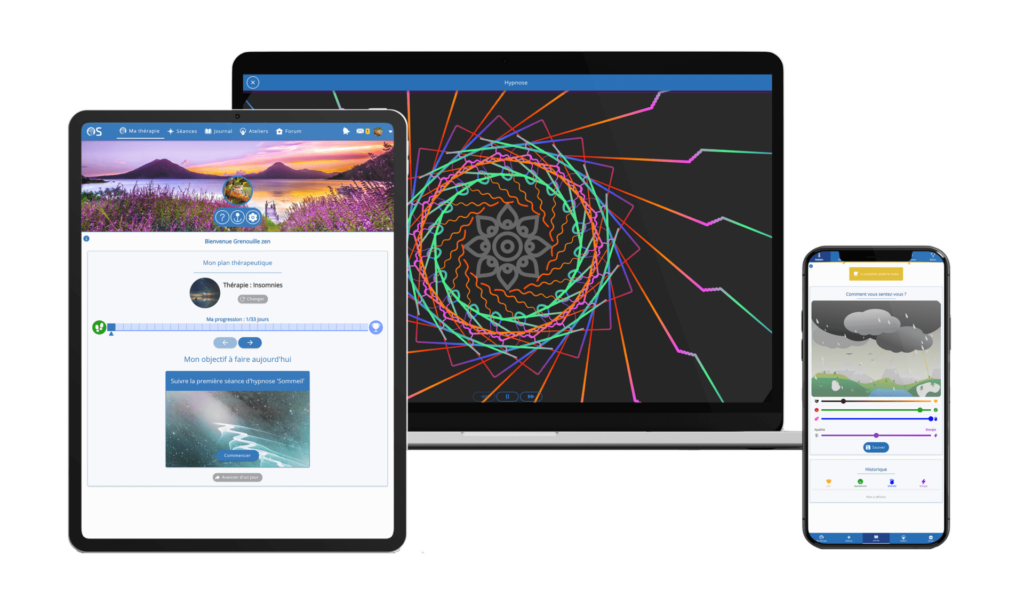In the quest for fulfillment in love, we're often on the lookout for advice and fresh perspectives to nurture and enrich our relationships. That's why Gilbert Dagon's captivating live presentation on building a fulfilling love relationship is an invaluable resource. In this inspiring presentation, teacher and relationship expert Gilbert Dagon shares insightful advice and profound reflections on the nature of loving relationships and how to cultivate them to be fulfilling.
Watch our entire live stream
In a nutshell
One of the key ideas addressed by Gilbert Dagon is the lack of teaching on human relationships in our school curricula. He stresses the importance of understanding relationship dynamics, and suggests that those who have a fulfilling love relationship can offer valuable keys and advice.
Gilbert Dagon also focuses on wealth within a couple, going beyond the financial dimension to encompass relational, intellectual, emotional and communication wealth. He stresses the importance of clearly established and shared rules in cohabitation, questioning the Western norm of marriage based on initial love, compared to other cultures where marriage is a convention.
Key points for a fulfilling relationship
Another crucial aspect of Gilbert Dagon's presentation is his perspective on the need to live consciously for a fulfilling relationship, emphasizing the importance of sex education, communication and building a fulfilling sexuality. He highlights the fact that love is made up of both time and attention, underlining their importance in revealing problems in a couple and finding solutions.
In addition, Gilbert Dagon suggests ways to rebuild communication and complicity in times of divorce, going through different phases of grief. His presentation offers a nuanced, wisdom-filled perspective on the complexities of romantic relationships, while offering practical advice for overcoming challenges and cultivating a fulfilling relationship.
Conclusion
This captivating live book is an invaluable resource for those seeking to deepen their understanding of relationships and improve the quality of their married life. Gilbert Dagon's advice offers an enlightening perspective on building and maintaining fulfilling relationships, while encouraging deeper reflection on relationship dynamics. Whether you've been in a relationship for years or are looking to build a solid one, Gilbert Dagon's invaluable advice will inspire and guide you along the path to a fulfilling and rewarding love relationship.

Further information
Find all our Lives videos and podcasts on our blog.
You can also try out our platform dedicated to well-being and mental health, where we offer programs combining hypnosis, sophrology and 9 other methods for :
- Reduce your stress
- Reduce your anxiety
- Getting out of a temporary slump
- Better sleep
- Get back into shape and slim down
- Quitting smoking
- Rediscovering a fulfilled sexuality
Test it for free on https://app.opensynaps.com
Full video transcript
Good evening, good evening, good evening, good evening to our communities of OpenSynapse, CentroAura. We're a few minutes late, we've had one last little technical problem, which often happens with this kind of tooling. Here we are, with everything we need to put in place to be able to broadcast on all the OpenSynapse, CentroAura platforms and all the social networks in which we appear. I don't even have the whole list, that's up to my team. So there you have it, and it's a real pleasure to be back with you at last after a month, a little over a month in fact, because there was the vacations and then we thought we'd get involved and be with you, well, just in time for the start of the new school year.
Already, on November 3, wow, it's flying by! I don't know about you, but it feels like the whole year has flown by! I was saying to you, get ready already, think about getting your Christmas presents ready, it was in August or July, well now it's really time, before it's the last moment. So there you have it, it's a real pleasure to do these direct talks with you, because it's as if all of a sudden the doors, the windows, the frontiers are disappearing, and it allows me to really be in direct contact with you and with as many people as possible. In my business, I often intervene on behalf of people, which is mainly my core activity, in both accompaniment, therapy, coaching and teaching, and it also means that a very small number of individuals can interact, or have the possibility of interacting, with a limited number of individuals, even if this number is quite large over the course of the year. And this is really my opportunity to address an even greater number of people, and it's really a great pleasure, a great honor to communicate with you and to be in constant dialogue with you. You may see me here, you may have the impression that I'm at ease, it takes me a few minutes to feel at ease with you, it's never an easy exercise for anyone and it's always an exercise.
And then we'll see what happens each time, that's how it goes. So this is a day when we're going to talk about a subject that's quite delicate, but oh so important! Because we're going to spend our lives having to, or trying to, live the experience, hoping to live with someone. And not once have we been taught or told or taught how to do it after all. The only examples we had were our parents. So if it went well, we have good examples, maybe even a very high bar. And then, if it didn't go well, you end up with no tools at all, or with the tools you've seen, but which didn't get the right results. And that's it. And we spend all our studies, all our schooling, doing things that make relative sense, even at the time, and then are quickly, very quickly forgotten. And not once do we talk about psychology, communication, how to interact with others, how to get to know yourself, what you learned at school, how to get to know yourself.
I think this is a major failing. And just because we're not doing it today doesn't mean we can't do it in the future and ask ourselves a few questions about pedagogy. So perhaps if there are pedagogues watching us, I think it's also a source of frustration for many teachers, because I don't blame teachers, they do what they can. But sometimes, when they try to change things a bit, it backfires a little. I know something about this, because I also taught at the HEP, the teacher training college, so that I could learn to teach, because there are no studies on that. You learn the program when you're a teacher, but you don't learn how to teach. And when it comes to subjects that are going to be important in life, such as communication, getting to know one's self, relationships with others, especially love relationships, what we're talking about today, today's subject, well, not a word, nothing is said to us, nothing is taught to us, as if everything had to be known just like that, or if there was no learning possible. And in fact, maybe there are a few keys, a few tricks, a few ideas that would enable us to function better, and then maybe achieve our goals and be happy. But why?
Why do some people live happily as a couple all their lives? Because you can also live a whole life as a couple, and then be profoundly unhappy, feeling alone, just to have someone for society, to show that you're in a couple, because there's social pressure on that too, on this subject, and miss out, in fact, on love, on the relationship. So why is it that some people live happily as a couple for a whole lifetime, while others just can't manage it, grumble about it, go from one couple to another, maybe even live in an unhappy couple, and don't dare, or don't change, and don't get out of it? Well, maybe, maybe, if we took an interest in people who are living happily as a couple, and in a lasting way, maybe there'd be some keys, and maybe they'd have some advice to give us. Well, this is more or less the idea behind NLP, neuro-linguistic programming, which models, as we say, how an individual who succeeds in a certain function, a certain task, or in a certain field, does it, and are there things, a psychology, concrete actions that he carries out, that can be reproduced by someone else to achieve the same results? Now, NLP isn't the only thing that does this, it's been extended to a number of fields, but the idea is that if you want to do something, take the example of someone who's already done it, you'll save time and be more efficient. Well, then, by modeling, by observing people who have succeeded, who succeed in establishing a rich couple, as the title of this presentation today, this debate, this presentation, or this reflection, let's rather say, it's a reflection today, I don't want to give you any truths, because maybe there aren't any in this field in terms of truth, everyone will find their own truth, but maybe there are some ideas that we can hold on to, test, and then maybe that can help us. Well, these ideas have been observed in certain people, and we can see, by observing several people, that they always come up with the same points, and then, when we find the same points, we might say to ourselves that there's perhaps some kind of recipe, some kind of key, some kind of information, which might be useful to try, to test. So that's the information I'm going to present to you. I'd have preferred it to be like a debate, i.e. with exchanges of ideas, but hey, that's the principle of this webinar today, it's a bit one-sided unfortunately, but why not, ask me your questions, and get involved, and it'll be an opportunity to bounce back and get some participation from you.
So, the theme is how to be in a rich couple, and rich, we can hear a lot of things about the term rich, what is wealth? We can hear financial wealth, but not only that, that's the first point, is it the idea of being rich together, or what is a rich couple rather, since the idea in the title is how to be in a rich couple, and it's a rich couple, not just rich, being rich. Well, it's rich in the relationship, in fact, that's more what's understood in this title, which came from our participants in the OpenSynapse community, and which is precisely how we formulated it, and we really liked this idea where we can see several types of richness. There's the richness of the relationship, there's the intellectual richness that can also be found in a couple, there's the exchange of communication, there's the financial richness, the financial ease in the couple, which can lead to perhaps different adventures, let's put it quite simply. There's the richness of the relationship, there's the connection to the other, and there's the emotional richness, and there could be more.
And it's about being rich, in other words, in a form of abundance. To be in a form of abundance that allows self-fulfillment, through the couple, through exchange with the other, and in life, and in the sharing of everyday life. So that's how we could define the thing, or the title, or the theme. It's an extremely complex theme, and I don't think there's any subject more complex than the relationship with the other, in the absolute sense. And it's even more tenuous when we're talking about couples. Living with someone else is extremely complicated.
We've already seen it in the family, that's all. Living with children, sharing a space, sharing values, conventions, rules, expressing them, establishing them. Are they clearly expressed? Are they clearly established? Are they very clearly communicated? Or do they lie beneath the surface, and then it's kind of self-evident that everyone has to understand the ins and outs for themselves.
And that's where all the stakes are. People who manage to establish very functional rules, which are established, said and expressed, work better than those who never express them, for whom it's taken for granted, and there's no need to say or mention it. And so there will always be frustration that the other person doesn't understand. In the family, when you're living in a community or a group, living with a friend or flatmate is also quite complicated. And we see that roommates who work well are those whose rules are clearly laid down, whose limits are set and who make things clear. So we can see that there's something strong in communication. And then there's life for two, the life of a couple, the life of a loving relationship. That's how married life normally begins.
Normally, is this really an absolute standard? Is it really a worldwide standard?
I'm not sure. There are plenty of countries where marriages are made by convention. You get to know each other through marriage. And it's more a Western notion to start with love and then start building a couple. Is there anything right, wrong, better, worse? I don't know. I think it's individual and it's each person's way of living the thing, of living the experience, of immersing themselves in the experience. And there are two different ways of immersing oneself in the experience. There's the unconscious way, where I undergo, I'm not behind the wheel of the car of life, where I'm in the passenger seat or even the back passenger seat and I contemplate or I don't decide on the direction.
Someone decides for me. And then there's the conscious way, where I sit in the driver's seat and choose a direction and go. I go at my own speed, according to the rules of the road. And then depending on how I want to go and what route I want to take. So there are these two aspects. And so the conscious part will enable us, the way of living things in a conscious way will enable us to be a little more fulfilled certainly, to find fulfillment despite the elements of constraint. That's because we can choose them.
That's about it. I won't go any further into the subject. We could find other examples and talk more about them. It's an almost infinite subject, there's so much to say about it. It's a pity that in education, we only have sex education to talk about relationships. I think there's so much more to be said about sexuality and its purpose. How can we build a fulfilled sexuality? How can we build a sexuality that is truly conscious of our relationship with others? And in these moments, or in the moments that spill over a little, we could also have talked about the couple's relationship, the relationship with the other person. How do you maintain a good relationship, or build a good relationship, or how is a relationship born?
Or quite simply, what is love? That's a question I ask everyone who comes for a therapeutic consultation, sometimes coaching, based on a relationship problem, a love problem, a couple's problem.
Basically, what is love? And 95% of the time, if not more, I'm being really soft here, it's even more, we're close to 100%. The 95% of time, the 95% of time for our French friends, well the only answer I get is, that's it, I don't know. It's something you feel, it's something that happens to you, you don't know why or how, and you don't know for whom. It just happens, by chance, and then it works inside you, it's physical, and that's it.
Okay, well no, there's a lot more to it. And there's a lot more to understand about love. And if we've reached this point in our understanding of love, well, we're in the back seat. In other words, you contemplate the landscape and then take what comes. Which means that sometimes things come, then sometimes nothing comes, because the car's stopped, there's nobody driving. And it's sad and it's a pity, because it would be nice to understand that you can get out of the car, get into the driver's seat, and take the wheel of your life.
Sell the wheel and build the love you desire. And that's what being in a rich couple is all about: building the love you desire, not the one that comes spontaneously, by default or by chance. And that's what I think is very, very important.
How is love born? What is it? There are a number of people who have looked into this, and there's someone whose definition of love really struck a chord with me. It's Idrissa Berkine. I don't know if you've heard of him.
Very, very great thinker and theory developer. Someone for whom I have great esteem.
Not least for discovering this. It seems to me that it was he who issued it. It's the fruit of his research. Certainly, maybe it's been taken up, I don't know. In any case, I got it from him. He says that love, attraction for something, when you have an affinity for something, whether it's for ham, whether it's for a food, pizza, whether it's for a video game, whether it's for a car or a person too, there's an equation. Even before Idrissa posed, I had this definition of love.
Love is an equation. And he poses this first equation, this first level, which is the basis for all attraction, for all love, for all desire, for all craving. When you're in love with something, let's take two examples: a person and a video game, you want to spend time with the person or play the video game. So there's a notion of time.
We'll give our time. We're going to give time. We want to spend all our time with this person or the video game. The more you like it, the more time you want to spend. And we're not going to spend that time just any old way. I'm not going to spend my time on a video game half-interested in it or chatting with someone, then playing, then chatting with someone. No, the discussion will take a back seat if I'm really interested in the video game.
For the person, it's exactly the same. If I want to spend time with the person, and it's good for me to spend time with them, I'm not going to spend time with them. I could, and this is what sometimes happens in certain couples, the person is next door, I spend time with them, but on my cell phone. I'm with the person, but on my cell phone.
My attention shifted to my cell phone. Is this worth anything?
Well, it's not. That's why love is both the desire to spend time with attention. And maximum time for maximum attention. If I spend all my time with someone, but I'm focused on something other than that person, it's worth zero in love. On the other hand, if I give someone my undivided attention, but only have two minutes to give it. But that's maximum attention. Well, that's worth zero. Why is it worth zero? Because it's attention times time.
Haste, as Idriss says to Barkhane. They're in a hurry.
Attention times time. And it's not attention plus time, because ten plus zero equals ten.
But ten times zero is zero. And that's precisely where you can already see a lot of problems in a couple. Are you still spending time with each other? And is this time of quality? Do you give him or her attention when you're with the other person?
Or does it go without saying? You occupy a space with each other. And then you each occupy a nearby space, but no communication, no exchange, no attention.
Well, evaluate. And this can indicate a problem, as well as a solution. Because if you see that, all of a sudden, he's running out of time, you give a lot of attention, you're with the other person when you're there. But on the other hand, that time is reduced. Well, you know what you have to work on. On the other hand, if you have a lot of time, you spend all your time with the other person. But then, you're on your cell phone, you're talking on the phone, you're on the TV, you're on the computer and everything else.
But you're with the other one. But no, you're not with the other. And it's not nurtured. This relationship is not nurtured. So love is already basically an equation. Haste. And then there's a personal equation.
In other words, what touches me? What do I need to feel loved?
And that can be different things. Some people hate to be touched. There are people who love it, who need to be touched. Some people need to be told that they're loved. Some people need to be told, to be loved. Some people need to see signs of love, gestures, attentions. Some need to experience things. Some need to escape, to go outside, to have demonstrations like that. Others don't.
Others, it's too much. As they say. It would be interesting, to live love to the full, to know yourself and what it is. What it is for you. And what it is for the other person, of course. So you can give it to them. And if you give the equation of the other to the other, you can be loved by anyone.
Yes, that's it. To be loved by anyone. To rebuild a lost love. Creating that rush with someone who doesn't have it in the first place.
Haste, attention, faith, time. These are just a few of the issues involved in being a rich couple. Allow me to introduce myself for those who don't know, who are just discovering me.
I'm Gilbert, Gilbert Dagon. I'm co-founder of the Aurora Center. Director of therapeutic programs for the OpenSynapse application. A revolutionary application that guides you through the tools of hypnosis. Because my specialty is hypnosis. In various therapeutic programs, 24 hours a day, 16 days a week. To fill the gap that sometimes exists for psychologists who can't do more than they do. In therapeutic practices like mine, too, which can't accompany people 24 hours a day and respond at any moment in case of... distress, well that's what we wanted to provide by creating OpenSynapse. OpenSynapse is a team, the Centre Aura too, it's not just one person, of course it's me who's mainly in the forefront, but it's a whole background of people who work and develop really relevant things in a really... they do it with heart, with enthusiasm, with energy, with faith too enormously.
I'm thinking in particular of Charlie Ayos, the founder of OpenSynapse, who really created this impetus, and then there was all the development we did together to bring the best of what we can do today at a distance with people, and in particular with hypnosis, with all the possibilities of hypnosis. We've put in anchors on five sensory channels, infrasound to work on people's different problems, subliminal suggestions, metaphors, deep trans, lighter trans, and we've also left room for artificial intelligence to create individualized sessions all the time. So you can do the same program over a hundred times, but you'll never have the same session twice. And that's interesting, because for hypnosis, when you arrive, you do a hypnosis session, you start from point A and arrive at point B at the end of the hypnosis session. So listening to the same hypnosis session again, going back to point A and arriving at the same point B, and doing the loop like that 50-60 times, won't do much good. On the contrary, it will be very limiting, and may even inscribe limitations or boundaries within yourself.
So that's what's so interesting and new about what we're developing. We're often compared to Petit Bambou or applications like that, which are very, very good, which I've also used and which are excellent. And we're not at all in that field, in that register. OpenSynapse is really going to work on therapy, how to really inscribe lasting change with support. There's a forum too, where you can talk to each other, find a support buddy who's there with you, who's dealing with the same issues. We have workshops that create pedagogical content to help you understand yourself and how to function better. So it's really huge, it's really big.
So those are my two activities. The Aurora Center, we're mainly here to provide educational content, to teach self-hypnosis. Mental coaching is also a book I've written, coaching mental tome 1, it's not a tiny book, it's over 400 pages long, unless I'm mistaken, here we are within 400 pages, to learn what we should have learned at the age of 7 at school to function better or create our own happiness. It's beyond the possible, mental coaching 1 on Amazon, you can find it very easily. And so we offer content on this platform to help you get to know yourself better, content that is sometimes reduced for small purses and then to learn great tools very quickly. Then there's content that's a little more elaborate, like mental coaching, which is a 24-hour online course that you can listen to again and again, and follow with your family, or self-hypnosis, which enables you to learn this tool on your own, and by reviewing the videos, with support too, because I'm always in touch with you, so as soon as you ask me a question, I receive it and answer it. So there you have it, and in the ORA center, there's also a platform for those who want to make a career change and learn the tools of hypnosis. It's the most highly-developed online school and teaches every form of hypnosis currently available. So there you have it. And then I also receive people in my practice, yes, I still have a little time in there, to receive, voilà, to do three aspects of the five judiciations of hypnosis, therapy, mental preparation, particularly for entrepreneurs, for companies, for groups, for pregnant women, to learn to give birth with self-hypnosis, for top-level sportsmen and sportswomen, for the moment I've done seventeen sports for top-level professional sportsmen and sportswomen, and then self-knowledge, personal development, self-knowledge, even spiritual knowledge, because when we go to this level of self-knowledge, we're going to touch on things that are almost of the spiritual order. So much for this little presentation of who I am and why I'm talking to you, because I receive people who are in this kind of difficulty, in a couple, I've been in one myself, and there are times when experience enables us to talk about it better, and to unpack things.
As I often say, it's very easy to be a Buddha, to be a sage in a monastery, in a cave isolated from the city, from the problems of all the people and the world. It's extremely easy, there's just the beginning, it's the decision, and then to go there, and afterwards, well, there you go, it's very simple. But on the other hand, to be a wise man in the city with obligations, with responsibilities, with burdens, with a family, with a spouse, with children, well that's a lot more complicated, and there, it's certainly much more valuable, at least in my opinion. So, through experience, you can learn from it, and then take the keys, the ideas, and then share them. That's why I'm here tonight, why I'm spending time with you, to be with you, to distill these tools. Because dozens of years ago, 13 years to be exact, when I learned this, I discovered this, I was already of a certain age, and I already had pots and pans that I had taken with me, and that I was still dragging around behind me, my suitcases were full, and no one had ever told me that I could part with them, it was like an inevitability, like we had to carry them all our lives, and then that's how it was, because that's how it was, that's all, period. And then, exactly 13 years ago, I came across hypnosis and all its related tools, which enabled me to cut the wires, to empty those suitcases and leave them behind. And I realized at the time that the tools I was being offered, that I was using to do this, well, they were already over twenty years old, thirty years old you might say, almost. Today, these tools are almost 40 years old, and there are still people out there who have never heard of them, and who are dragging pots and pans and suitcases full of them behind them.
And that's exactly what drives me. So I know that sometimes what I say will shock, sometimes what I say will have the opposite effect, sometimes people will say but yes but, well, he's overdoing it, he's exaggerating, it's not possible, and then he wants to sell his thing, yes I know that it can sometimes give that impression, but because it's changed me so much, it's served me so much that I'd like as many people as possible to be able to use it. And how it's helped me, it's made me independent, it's made me independent of medicine, even of therapists, even of coaching or anything else, it's made me independent, even if today I still obviously use or go to see therapists because there's still the link with the other that's important from time to time. I also have a coach, of course, because I know that with a coach things go much more quickly, but there are many things that I already do on my own, many things that I do on my own and that enable me to move forward and above all to maintain and create happiness in my life. Yes, because for a long time I wasn't happy and today I can say it and I can say it, I'm happy and I'm building my happiness every day because just because you're happy doesn't mean it's all good all the time, not at all, not at all. There are storms like everyone else, there are plenty of storms and this year 2023, I don't know about you, but I've had my share of storms.
Of course! But there are certain tools you can use to learn how to be a captain. Do you think a ship's captain hasn't learned to be a captain, hasn't learned to navigate, has learned about the tides, the sea, the currents and the wind?
Well, he did! And he's learned to pilot his boat. And that takes years. Yes, it doesn't just happen, like a wave of a magic wand. And the couple too, the couple too is an apprenticeship, and that's what we never say. And then you go from one failure to another, saying to yourself, well, I'm no good at anything, or I'll never make it, or it's my destiny, that's just the way it is. Someone who also gave me a few revelations about that, about relationships, in the form of a good slap in the face.
Slaps wake you up. That's why I'm quite afraid of slaps. And I give some of them with love, a lot of love and empathy because I've received some too and that's what woke me up and that's what has served me well. A great master in there, master in, not in the form of a guru, but because he's someone who brought me. So was he able to apply it?
I don't give a damn. It's just that he understood something. I think he's applied it to his life.
It's Yvonne Dallaire. Yvonne Dallaire is a couple psychologist, who's been specializing in couples since all the first lectures I heard from him, which must have been some thirty years ago. He's not getting any younger either. And so, it's really, he's a couple psychologist, a Quebec couple specialist, nice little accent, and he said this, he's got so many interesting things. If you want to delve into the subject of couples, I recommend his books, his writings and his lectures. He used to say that living as a couple is like playing on a chessboard, so it's a chessboard, the other playing two checkers, and the other playing chess. So one has checkers, and the other has chess. Well, you can see that it doesn't work, the rules aren't the same. It's the same chessboard for both games, but the rules aren't the same.
And we're trying to play these two different games on the same board. And as long as we don't learn to play the other's game, to understand the other's rules, we'll be stuck. We'll be frustrated, misunderstanding and blaming the other, because of course we don't realize that the other doesn't have the same pieces as us, doesn't have the same rules as us, so we're the ones who are right, or else it goes without saying that we're playing the same game. So it's not even a claim to be right, it's just that we're not aware that we're not playing the same game. So why doesn't he react the way I want him to?
Or how he should react instead? And that's how it is. And I think it really illustrates my feeling, my perception of the couple. We have completely different perceptions. There's another author who expresses it in another way, saying that men come from Mars and women from Venus. And no matter what you think, no matter how critical you are of this book, there are many things in which you can recognize yourself. He says in this book that it's a masculine energy and it's the feminine energy that evokes it, and not necessarily men and women. And that a priori, it would be men who function like that, but we sometimes have a feminine that has awakened a little more or that has developed a little more and that makes us function more as men in a feminine way or as women more in a masculine way.
But we'll still see, we'll still find these patterns most of the time. There will be exceptions, and we won't find all the patterns described in the same person, but we'll recognize them all the same. We'll see that there are some patterns that can be identified and worked on, and that will make the couple, the communication or the relationship smoother. Yvonne Dallaire also gave me a good slap in the face at the conference when he asked this question. What's the lowest common denominator between all your exes?
And I'll give you some time to respond. And it could be anything. The exes but it could be everything, if you've swapped jobs a few times, the different jobs you've done. What's the lowest common denominator that all your exes have? Well, there is one, actually, and the lowest common denominator of all your exes is you. So if your exes have become exes, maybe the problem isn't necessarily with them and maybe there are things you don't know or that you do know that led to the separation, that led you to, I wouldn't say failure because the end of a couple isn't necessarily a failure. The end of a couple is just the signal that there are two paths diverging and separating, each going in two different directions. There will be a feeling of failure if there's no awareness and no joint decision, and you're a victim of it. Once again, it's because perhaps you were in the passenger seat of the car of life, of your life above all.
So, what is love? What is a relationship? First of all, relationships don't just happen, and you're not with your double. Even if there are many sides to us that are similar, and we'll come back to this subject later, I'd like to ask you the question: there's the other. There's you and there's the other. And the question is, in love, one plus one equals how much? Well, I'm pretty familiar with the answers. One plus one equals, there are many who say one. One plus one in love equals one. In other words, one merges into the other. If that's what happens, one loses his identity to the other.
So he blends into the other person's life. He loses all his friends and takes all the other person's friends. All the passions, all the activities, it happens, it happens. And as a result, he completely loses his identity. And there comes a point when it's like a burn-out of the couple, you could say, or a depression. Because when you try to erase yourself, then rebuild yourself in the place of the other person, you lose yourself. And you can't live without yourself.
You have to live within yourself. That's one of the first rules of life. Because, I remind you, we only have one life to live at a time, and that's our own. Whatever you think of life, whatever love you have for others, for a child, for a spouse, for a parent, you can only live your own life.
That's just the way it is. So it's good to be in your own body and share moments with the other person. That's all you can do. Even the person you love most in the world. That's all you can do. So, often, we hear by 1, people who answer 1 plus 1 is equal to 1, hear rather, we melt each other. So, it's half plus half. Besides, in life, we say, you're my half, my little heart, my half, something like that. And then it's as if I'm only one half, and the other is only one half. And together, we form a whole, a 1. It's a half plus a half equals 1.
Yes, OK, in that case, it's true. But 1 plus 1, it doesn't equal 1. So, sometimes, when I can't find it, I'm told that 1 plus 1 equals 2. Yes, so 2, 2, 2, 2, 2, 2 living 2 apart. So there's no union. So everyone lives their own life. We're not a couple, so we're just friends in Canada. We have a little sexual relationship from time to time. That's why we're not really a couple, but almost a couple. But we each live our own lives. So that would be 1 plus 1 equals 2.
Then there's the answer that comes from time to time. Jean-Claude Van Damme said it to me, not directly, but 1 plus 1 equals 11. Yes, that's another matter. We're not going to talk about that tonight. But 1 plus 1 is equal to 3. There's me, there's the other and together we form a we, which is the space of the couple that's being built, that needs to develop, that's the foundation of the desire to spend time with the other and to give him or her attention.
And this is maintained like a green plant. A green plant needs soil, light and water to live. Well, the couple also needs three elements. And I'll come to that in a moment. And it's this part of us that is the bearer of a common project. And if there's no common project or objective, well, this thing unravels over time. It disappears. And that's why the more consciousness we put into these things, the more chance we have of keeping the us, the love, the relationship with the other alive. And that's what's important in this movement, in this space.
It's having a common goal. It can be a business, it can be a family, it can be travel, it can be different, diverse and varied projects. Often, we think, we forget to think, that in a couple, it's two individualities. It's as if all of a sudden, when we're in a relationship, we think it's as if we're building love, we're building the couple and then we're close. And so, all of a sudden, it's as if we've somehow merged with the other, as if the other belonged to us, we were an integral part of the other, or that the other was an integral part of us. And we forget that the other has a body of his own, a heart, thoughts and emotions that are unique to him, based on the three filters that make up all of us. The neurological filter, the sensory channels through which we perceive the world and express ourselves. We obviously have five sensory channels through which we perceive the world. The visual, the auditory, the kinesthetic, touch, movement, the senesthetic, interiority, the vestibular, external space, orientation in space, the olfactory, odors and then the gustatory, taste. Everything I've called vestibular, which is senesthetic, is kinesthetic, and we're going to integrate it into the kinesthetic, five sensory channels: visual, auditory, kinesthetic, olfactory and gustatory.
But we don't function with all these channels developed to the same level. We have one channel that's more developed than all the others on which we're going to express ourselves, and see a second that's quite high too, but much lower than the first. Then the rest is really almost non-existent.
And we don't realize it. That's our first filter. Then there's the cultural filter, the culture into which we were born, which has shaped us in one way or another. And then there's all the personal experience, all the learning, all the automatisms, all the things we've been taught. So we also forget that the other person has a whole world of his own, and that he's the bearer of that world, and that each time we have to go and rediscover it. Even after ten years, it's still a world of discovery, because this world is never fixed.
It's in motion. Paying attention to the other person, of course, their needs, their desires, their way of communicating, what's really important to them, how they function. And the other person is often, and this is what sometimes lures us into certain situations, the other person is like a revealer of our wounds, like a mirror of what affects us, what makes us work. And maybe that's the point of all this, and maybe it's the point of all humanity: to work on ourselves through others.
Because without the other, I'm nothing. And that's what's really important. If only at the very basis of being human. Human beings are not made to live alone. The human species is a gregarious species, a species that lives in packs. So we're not made to live alone, we're made to share things, to exchange. And that's why we have such a need to recognize ourselves in others, to live with others. And that's why sometimes it's so painful to be alone, not to be accompanied, not to be in a couple, not to be part of this norm. Why has this norm developed the way it has? On the one hand, it's a way of having children, of reproducing. So there's something instinctive about being with someone.
For security too, which drives us to be with someone for their own safety. So we can see very quickly, and I'm not going to go into the details, we'll come back to that, but Maslow's pyramid is completely false. We need security, but it's not the first level that will guarantee it. It's being with someone, being in a community, that will guarantee security. We'll come back to that later. I'm not going to dwell on it, because if I don't, we won't have been together for an hour, we'll have been together for two or three hours. I feel sorry for you, I think you've got better things to do than listen to me. It's just a premise, some ideas I'd like to propose to you today. That's all they are. There's a saying that marriage was invented at a time when life expectancy was 30 years.
I like that sentence. And indeed, why?
Because we evolve. And in a couple, we don't always evolve at the same speed. Especially if this us, this space of three, the us, the couple, is left aside. It's not taken into account, it's not considered. It's not inhabited and it's not nourished. As a result, it will unravel over time, and then it will disappear and we'll find ourselves in two or in one that has merged with the other.
And then comes the pain. It's the pain of separation. And evolving as a couple requires something fundamental. It requires lots and lots of communication, taking an interest in the other person, being aware of the movements that go through us. To communicate this to the other, because the other isn't a soothsayer, so the other can take an interest, can ask questions, can be a revealer, but when it's done consciously by both of us, well, we can grow together. And that's what's going to guarantee that, over time, we'll still have an interest in being together. Because sometimes, time shows us that we have interests that have become different, that have changed, that are far apart. And as a result, there's no longer any point in being together except to fill an inner void. And this is also where there's a lot of motivation to be with someone to fill an inner void, to fill a wound, to fill, not to be alone with yourself.
Because you simply can't live with yourself. If you can't live with yourself, how can you expect anyone else to want to live with you as you are? Yeah, well, why would he or she agree to live with this person you hate to be, that you can't even stand? Maybe there's something to be changed there, don't you think? So there you have it, evolution is to be taken into account, and being aware of the other's evolution allows us to adjust, to reflect together, to evolve together, and that's really what's so important. There's an adage that says "opposites attract, but like attracts like". And yes, the opposite of oneself, it's a bit intriguing, it creates love-passion in fact, love where we're going to tear each other up a bit, we're going to hurt each other, but stable love, fluid love, is with someone who has the same passions, the same values as oneself. And it's this construction of us, this construction of us that's based on shared values, shared beliefs, shared actions and shared hobbies. Not everything, of course, there will be secret gardens, personal things, but the more we share the same tastes, the same things, the more affinities there will be.
The desire to spend time with others and give them attention. It's obvious, and you see it in everyday life. If I'm with someone who loves scuba diving, and I love the mountains, we're going to make an effort at first, because we're going to discover each other. This person will come with me to climb mountains, and then I'll go scuba diving. But at some point, I'm not going to want to devote the little time I have to something I don't necessarily enjoy. So I'm really going to devote this thing to climbing, and then the other one will go scuba diving on his own. Then we'll meet up again, then we're autonomous, then it's cool. Then the person will meet someone who scuba dives, who loves it, and they'll find common passions, will communicate a lot, will have complicity, until the moment when something a bit more happens.
But yes, because love is just a scale between love and its opposite, hate. And in the middle, zero is indifference. Then, as you go up the ladder of love, there's friendship, there's connivance, there's super-friendship, until at some point there's a physical exchange, and then you're in love, you're in the couple, and then you're in the family, marriage. That's something that could be seen on a scale like that. So, all this requires awareness, and precisely sharing. As I was saying, love is built on three foundations, three pillars. Love is based, in my opinion, on something very personal to me, but it's something I'm proposing to you, it's an idea I'm proposing to you, for you to dispose of, to think about, and to see how you can use it to nourish your couple, to build your couple, to build happiness in your couple.
In my opinion, a couple is based on three pillars. The first is communication. There's no one more important than the other, because they're all interconnected. Communication is important in a couple: communicating, spending time and attention on communication. This communication will give rise, or not, but if we're in love, it will give rise to complicity, connivance, similarities and mirror effects. And it's this complicity that's going to be necessary, that's going to engender sexuality. And sexuality is based on communication, which is also based on complicity. And the more fluid our communication, the more we'll understand each other, the more we'll bring awareness to the couple, to our likes and dislikes. For that to happen, you obviously need to know each other, and I don't think I've stressed that enough yet.
Obviously, you have to know yourself. That's the basic point. The more we know about ourselves, the more we know about our desires, aspirations, values and beliefs. We've chosen our beliefs based on keeping the ones that lead us to surpass ourselves, rather than the ones that limit us. And the more we can communicate them, the more efficiently we can communicate with the other person, according to what's good for us, and then in correlation with what's good for the other person. If we can achieve fluid communication, we can also use communication to listen to each other, and thus be heard. And it's extremely important for a couple to be heard, to be understood. Understood. Taken with. Understood. Taken with.
It's like an embrace. If you know yourself and the other person, if you know how they work, you'll be better able to spot the differences in how the other person works, and then to get to know them too. Not in a reproachful way, but just in knowing the other person, knowing what the differences are, that we're not identical, and that it's not just a matter of course. And there are plenty of communication tools we don't know about and have never learned about. It should be, because it's also a subject that will lead us to solve things in our lives or create problems in our lives, communication. It should be, I'm talking about a compulsory course in elementary school. It should be, we should spend 4 hours a week on communication.
And there's so much material in there that in 4-5 years, we wouldn't even have covered it all. So, learning communication tools, you'll find them in the mental coaching course, in the book "Beyond Possibilities", in self-hypnosis too, and above all with oneself, because that's communication with oneself. Mental coaching is communication with others and with ourselves, because the first communication we have with others is with ourselves.
Complicity is precisely what happens when people are alike. It's about finding similarities, sharing common attractions, common tastes. And that's what makes people want to spend time and pay attention to each other. It's about connecting with what makes us different. It's this "us" that we want to build. It's not the same as the other person's, my neighbor's, my parents' or my acquaintances'.
It's this "us" that we build that's unique. And it's choosing it too, and doing so in complicity, in connivance with the other. The complicity of things that are important to you, of this complicity, of shared values.
I named it just before. What are these values?
What do we hold on to? What is our vision of the world? And how can we share it, exchange it, live it together? And the closer things are to each other, the smoother and easier it will be. The farther away they are, the more it's going to be in discussion of things that are going to hurt us, that are going to create frustration, that are going to hold us back. And then there's this complicity that allows us to evolve together. It's something I used to say was very important. Well, it's this complicity that enables us to be aware of each other's evolution, of our own evolution, and to make this evolution together. And then there's the third pillar, sexuality. Here too, sexuality is overused today, with a very deteriorated image, due in large part to pornography, and to the cognitive biases this creates on the representation of the feminine, and the representation of the masculine too, because we often talk about the representation of the feminine being devalued, but the masculine too, just as terribly, and which puts pressure on people to perform, on what they should be, what they believe they should be. And that's also a theme that we should be tackling more, and that we should be tackling in the spirit of conscience too.
In my opinion, there's only one kind of good, fulfilling sexuality, and that's when it's done consciously, when it's done in relation to the other person, and not just in one's own little corner, somewhere. I'm not even talking about masturbation, because masturbation is the very basis of sexuality, it's every person's first sexuality. So it's about getting to know yourself, and accepting it, of course. But there are many people who are in a sexual relationship, alone, even with the other person. And that's where it's hyper-important to bring awareness to this exchange, this sharing, and that's where there's also a whole current that comes to fight against this other current I've named, but which is in attention to the other, in awareness, in tantrism which offers precisely that awareness.
Without even going that far, just being aware. Awareness, well, that necessarily requires getting to know each other too. And the better the communication in a couple, the more intense the sexuality, the better the complicity, the more fulfilling the sexuality, obviously. So it's always interconnected. And the more complicity you have, the easier and more fluid your sexuality will be. And the more we communicate, the more we'll be able to communicate our desires and desires to each other. Sexuality is also about being in touch with your desires, knowing yourself, and then being aware, communicating and in touch with the other person. That's what I wanted to tell you, and what you can work on and develop in this theme, how to be in a rich couple, is first of all to be in a communication that is nourishing, in a complicity that is overflowing, that creates bonds, that unites you, and then in a sexuality that is like, let's say, the crown chakra, it's the crowning achievement of the relationship that is in the total fulfillment of body, mind and soul. And that's the fulfillment and richness of a couple. It's something that has to be done consciously by two people, as I said, you can't do it alone, and it's the challenge of every human being to find the person with whom he or she can blossom. To do this, once again, the key is to know yourself, your desires and aspirations, deeply, consciously, and to be able to express them.
Quite simply, to be yourself. It's a pleasure to share these things with you, and I hope that they can help you move in the direction of happiness, personal fulfillment for you as a couple, and enable you to progress and get to know yourself better. Let's move on to the questions. It's an extremely complex subject, and a very large and vast one, so I haven't managed to do it in 45 minutes or an hour. I'll take a few questions like this, I'm going through a divorce, but I'm sure she's the love of my life, do you have anything to say about that? Well, if you're going through a divorce, what separated you? What, in the ingredients, communication, and then complicity, common desire, the three I used to call, one plus one equals three, this us, me, the other, the us, how did it, what made it not survive?
And that's when you start to wonder. Everyone has their own life, their own autonomy, and you can't make decisions for someone else who has also decided to end the relationship that led to the divorce. In this case, I have the impression that the person asking the question is rather in a state of non-choice, that she's the one who's undergoing this decision, maybe not, but in any case that's what the message is perhaps abusively implying, and there are too many unknowns to be able to really answer this question. To avoid repeating the same thing, it's better to ask the question and go back to basics: how was communication? What level of complicity did we maintain? And then, the barometer of this communication and complicity is sexuality. You can bet that at some point in the divorce, there's no sexuality left. In the vast majority of cases. So, how do you build this communication, how do you rebuild this communication? How do you rebuild complicity, if that's still possible? And when you're already in the process of getting divorced, you've already made a decision, you've made an effort, it's not a spur-of-the-moment thing, and there's certainly a phase of understanding and a phase of mourning.
The phases of grief involve denial, of course, at first, then anger, then sadness, and then we'll be able to get back on our feet and rebuild. These are the phases of grief described by Kuberos. There you have it, it's just a general outline, and it's good to be prepared for it. That's all I can say on the subject. Don't you have a program on OpenSynapse to cure heartache? Well, not yet, because we're currently working on a program to help couples. On the other hand, we will be working on workshops on emotions and self-awareness. You'll also find, as I said, on self-communication and communication with others, notably on the aurora.ch center, things that will enable you to act through self-hypnosis, through simple techniques, transformation, reprogramming, that could enable you to cleanse a heartache, and then afterwards, self-knowledge through mental coaching. And then, really, if it's heavy and you can't get out of it, I urge you, in any case, not to stay there. There are some very effective tools that, in one or two sessions, will really enable you to turn the page, get over this disappointment and get through this mourning.
How come my relationships always last less than three months? Well, that's what Yvonne Dallaire was telling us, what's the lowest denominator? How, between all your accesses, is it you? So, chances are you'll have to work on yourself to get to know yourself or the other person better. Back then, I used to believe that when someone told me something, it was the truth. When my partner would say to me, when I'd ask her "are you okay?", she'd say "yeah, yeah, I'm doing great". She'd say, "I'm doing great," so it's fine, it's cool, so I don't have to worry about it, I don't have to worry about it. Well, learning that words only carry about 7% of information, that paraverbal is 38% and that non-verbal is 55%, well, that allowed me to change. Even if this notion is refuted in the scientific field, we understand that we can use it to our advantage and that it will help us to function better in our relationships with others. If I take an interest in the other person and deduce that even if they've told me everything's fine, well, that there's something wrong, well, I'm going to build a relationship that's a little more meaningful and important and a lot more harmonious, well, I've won everything.
So there you have it, self-knowledge and then, you can really work on it, it's not definitive and it's not determined in advance. That's it for the questions, we'll stop there. Thank you very much for your participation, it's a real pleasure to be able to bring you these tools that I didn't receive and that I received very late. I hope that's not too much the case for you, I hope there are young people who are with us, who are listening to us, who are there to learn these things. So, if it can just spark an interest in knowing more, that's even better, and then go and find out for yourself, test things out and then develop yourself. We're not finished, and that's perhaps the magic of the human being: we're infinite in our development, and it's just great that we can really develop and learn about ourselves indefinitely.














































